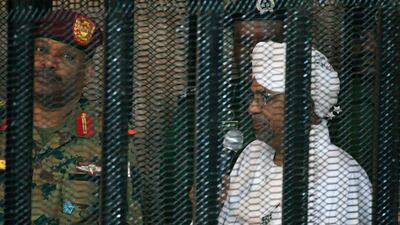Former Sudanese president Omar Al Bashir has reportedly been admitted to hospital with suspected Covid-19 symptoms.
The former ruler of Sudan was taken to Alia Military Hospital in Omdurman for a 24-hour period, which can be extended if necessary, his lawyer Muhammad Al Amin said.
Normally, Al Bashir, 76, would be held in Kober prison in Khartoum.
Last week it was reported that Maj Gen Abdullah Al Bashir, the former leader’s brother, died of Covid-19.
Al Bashir, who was deposed by the military in 2019 after mass protests, suffered several health problems and had surgery on his vocal cords in 2012 in Qatar.
A rule of infamy
Omar Al Bashir came to power in 1989 after organising a military coup against Sadiq Al Mahdi, Sudan’s last democratically elected prime minister.
While Al Mahdi’s rule was regarded by some as a constant struggle to find compromise in a politically fractured nation, Al Bashir quickly took control of state institutions.
He filled key positions with loyalists and mounted an escalating series of purges.
Al Mahdi succumbed to Covid-19 on November 26.
Allying with the Islamist politician Hassan Al Turabi, Al Bashir attracted controversy by hosting Osama bin Laden during the 1990s, after the Al Qaeda leader, described by Al Bashir as a businessman, was expelled from Saudi Arabia in 1991.
Bin Laden was eventually forced to leave Sudan in 1999, three years after openly declaring war on the US.
Under Al Bashir and Al Turabi, who died in 2016, Sudanese laws were increasingly steered towards a politicised brand of Sharia.
The former president faced constant intrigue against his rule but was known for directing state resources to loyalists, always staying a step ahead of any potential coup.
An oil boom in the 1990s and early 2000s boosted Al Bashir’s fortunes, helping his government to maintain high levels of military spending and shore up loyalist support as a decades-long civil war with the south continued.
His suppression of an uprising in the Darfur region led to him being indicted for war crimes against civilians by the International Criminal Court in 2009.
This overshadowed a 2005 peace agreement aimed at ending the country’s war with secessionist South Sudan, creating an autonomous zone and eventually a new country in 2011.
But peace did not last. Fighting between the north and south continued sporadically, particularly over coveted oilfields.
A new agreement with South Sudan was reached in 2012, covering oil and trade, but shortly after the agreement South Sudan had its own civil war.
Further arguments between Sudan and South Sudan over oil exports and revenues led to a sharp collapse in production, before global prices entered a long period of decline.
This accelerated Sudan’s economic collapse, stripping away the patronage powers of Al Bashir and paving the way for a popular uprising.
Under Al Bashir, Sudan failed to build an economy that was not dependent upon oil while corruption span out of control, restricting private sector growth.
For these reasons, the former president gradually the lost support of the military.
He is in a special jail for elderly prisoners and on February 11 the transitional Sudanese government agreed to hand him over to the ICC for trial.














